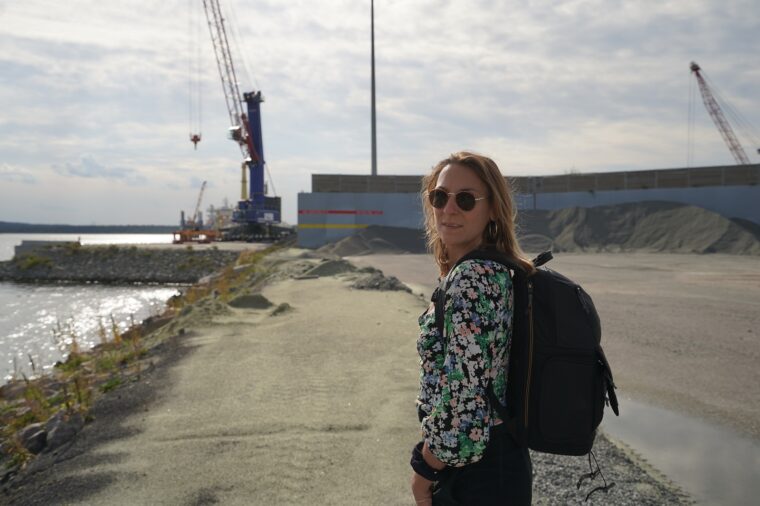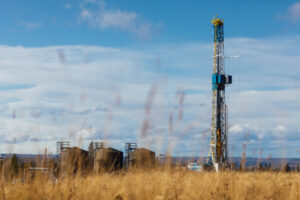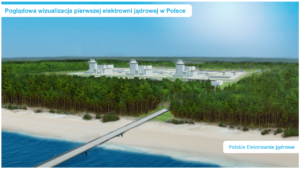„Everybody has their opinion on the future of Nord Stream 2, but the Akademik Cherskiy is being prepared as if it is to set out to the Baltic tomorrow,” Agata Skrzypczyk writes in a report for BiznesAlert.pl. „I managed to unofficially ascertain that the ship needs at least a month worth of work before it will be able to proceed to sea,” she adds.
A few weeks ago the construction of the Russian gas pipeline that will export natural gas from Russia to Germany has come under the public spotlight, because of a letter three U.S. Congressmen sent to the mayor of a German town of Sassnitz. A Russian ship called Akademik Cherskiy is docked in that German port town. The vessel is to continue the laying of pipes that will transmit gas across the Baltic Sea. The Congressmen threated the mayor with sanctions against the town and all engaged companies if the construction of Nord Stream 2 will be continued.
The threat of sanctions immediately started a political controversy at the highest level. Angela Merkel, the German Chancellor, personally defended the project and said it was necessary for Germany’s energy security. The U.S. President Donald Trump reiterated the possibility of penalties, while EU member states remained divided over the German plans, which go beyond the desired unilateral energy policy of the EU.
From unofficial sources close to Nord Stream 2, I learned that over a dozen employees came from Malaysia to work on the Akademik Cherskiy, and they are now stuck in Germany waiting for the project to re-launch. Some of them are staying at a local hotel, while others are waiting at a designated hotel ship. I decided to investigate what the dispute over Nord Stream 2 looks like from the local perspective of a German port.
The stories in the media were mostly told from the point of view of global politics. However, I was most interested in who makes the decisions in the region and whose word could transfer the disoriented Asian employees from the hotel to their work destination. Do the environmental concerns still play a significant role and who in the region is against the project?
I went to Sassnitz, the center of the entire conflict, to find out who is pulling the strings. After a few days I learned that nobody knew anything and that world politics was of no interest to anybody. Everybody has their opinion on the future of Nord Stream 2, but the Akademik Cherskiy is being prepared as if it was to set out to the Baltic tomorrow.
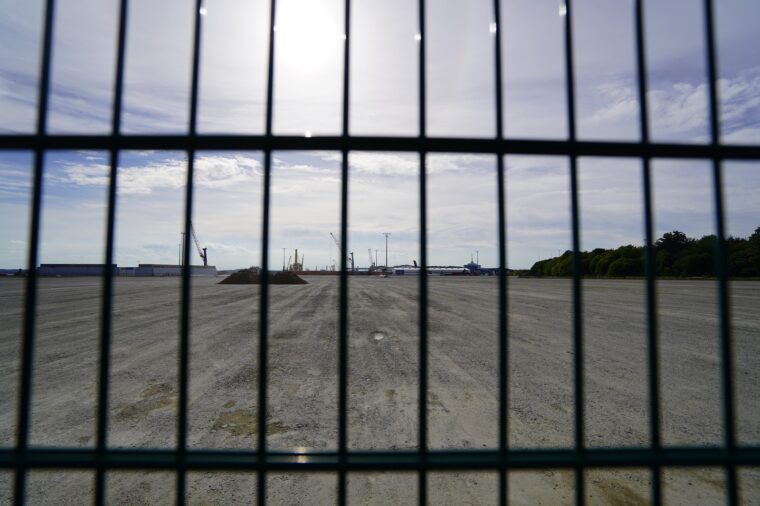
Across the harbor’s fence in Mukran
I am entering the harbor in Mukran, which is located on Sassnitz’s outskirts. I use old pipes to make a footbridge and bypass the fence. At first, I am a little timid about walking around this commercial port, but once I realize it is locked tight, I start moving quickly towards the Russian ship. From about 200 meters away I can already see a line of neatly cut 48-inch pipes, which are to export gas as part of Nord Stream 2. The pipes are marked with lines that have various colors, which symbolize at what depth they can be used. The concrete in which they are coated gives them a different resistance to hydrostatic pressure.
Hundreds of pipes are waiting on sand levees, which makes it easier to transfer them to smaller ships, that will transport them in batches to the Akademik Cherskiy. On the wharf one can see makeshift hangars, where the scale will be smoothed at the pipes’ ends. These large export pipes have been stored at the harbor for two years, which is why they got covered in rust at the exposed ends. From my perspective, it looks like the first batch is ready to be loaded on a ship. One is under the impression that the project is ready to go once it receives the green light.
There is nobody at the port apart from a few employees that are walking about on the ship. Usually, a passenger ferry departs from the marina to Sweden’s Trelleborg. Interestingly, the company that manages the ferry suspended the service in March. The official reason was the coronavirus pandemic, but, unlike other vessels, this ferry has not been reinstated. I am under the very real impression that this is about closing the harbor facilities, so that outsiders have no access to it.
I am slowly heading to the exit, but a security patrol catches up with me at the gate, with the lights and siren on. „What are you doing here?!,” the guard asks. „Working,” I answered truthfully. Once on the other side of the gate, I hear the same guard yelling at people who were standing behind the harbor’s fence and taking pictures, out of curiosity, of the Russian ship in the distance. „Pictures are not allowed! You cannot stand here!,” I hear.
Despite the fact that the issue of Nord Stream 2 is on a knife edge, and it seems that the laying of the first pipe may start any day now, I managed to unofficially ascertain that the ship needs at least a month of work before it will be able to set out. Contrary to the previous ship – Solitaire owned by Switzerland’s Allseas – which was contracted by the investor, the Russian vessel has not been used for years and is definitely less technically advanced.
Part of the crew that will work on the ship has already arrived and is housed on a special dwelling ship. The vessel is painted in white and black stripes, which truly attracts attention. When this floating zebra hotel arrived at the port in Sassnitz there was a lot of speculation on what was its destination. The ship is surrounded by a fence and guarded by the police. Despite the fact that I know the ship’s purpose from unofficial sources, I provocatively ask the steward behind the fence what was going on there. „It’s a secret,” he answers with a serious face. Probably a Dutch company that owns the ship does not want to be officially linked with the project for fear of American sanctions.
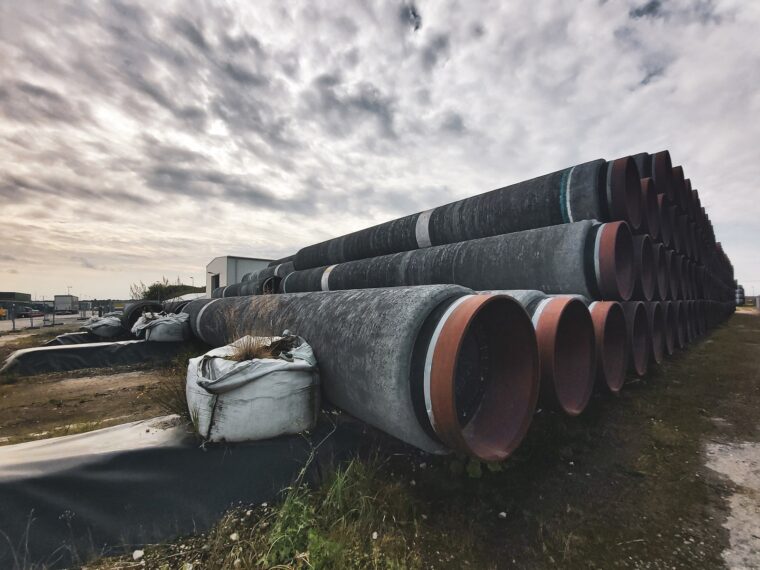
Sassnitz mayor is a local hero
The harbor town of Sassnitz has found itself in the center of a heated political conflict. The town of Sassnitz owns 90 percent of the Mukran harbor shares. Both – the ship that is docked there and the kilometers of stored pipes for the gas pipe, constitute revenue to the port company, i.e. to the town. However, this fishing town and its 10 thousand inhabitants are not used to the fame they suddenly got. Neither is Frank Kracht, the town’s mayor, with whom I meet during an early morning at the town hall.
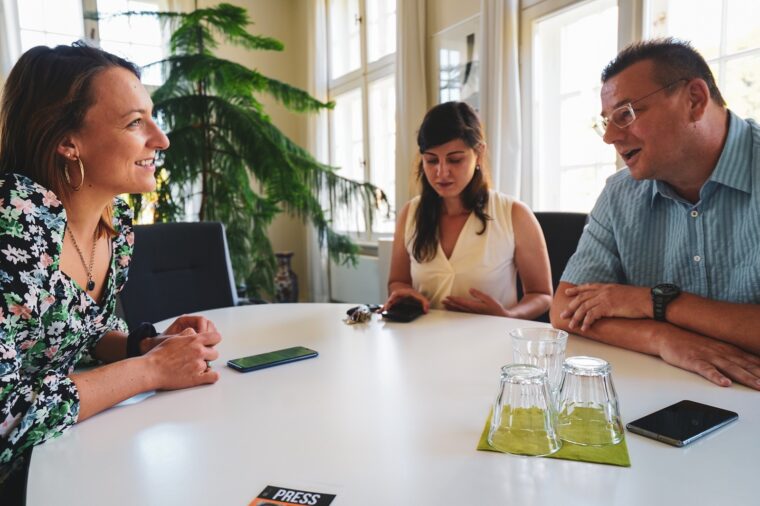
„I am sorry, I only have half an hour, I need to rush to a photo op in the town center later on,” Kracht, a sudden and unquestionable political celebrity of the German press, points out at the beginning of the meeting. It was Frank Kracht who received the letter that included the threats of sanctions from the three Congressmen. He states he would not send an official answer to not give those words too much relevance. Is he concerned about the possibility of sanctions? „Fear is a bad advisor, an unnecessary and negative emotion. We’ll see!,” he says.
These are quite careless words, uttered by someone who is responsible for the future of such a big project and its consquences. Kracht is convinced the project will be completed and that nothing could stop it. After all they have Angela Merkel’s support. „Did you meet with the Chancellor a few days ago when she visited the nearby port of Straslund to give a few press interviews,” I ask. „No, but we maintain regular contact over the phone,” he replies.
I then ask the mayor about the permit to replace the dynamic positioning system available on the Solitaire and supported via satellites with an anchor positioning system available on the Akademik Cherskiy. „It seems this is one of the few things, that may stand in the way. The huge anchors that go as deep as over 100 meters into the seabed have a measurably negative impact on the environment,” I share my knowledge. Mayor Fracht is listening to the interpreter who repeats the question several times. He assures me that the local authorities are not engaged in the process of issuing any permits and has no knowledge on the subject.
I ask about his opinion on the upwards of 40 employees from Malaysia who are to work on the Akademik Cherskiy, but who have been sitting idly at a local hotel for three weeks, waiting for the project to launch. Shouldn’t the contract with the investor say, for instance, that local people should be employed in the project, even if it cost more? I state that I have learned that over one hundred employees who will work on the ship come from all over the world, mostly from developed countries and, needless to say, Germans are not among them. „I know nothing about any Malaysians in the town,” the mayor responds confused. „We had no impact on the logistics and staff of the project,” he adds.
He then asks for the name of the newspaper I write for. Despite his gullibility, which I have felt during our meeting, Kracht does know one thing – he needs to pay attention to what he’s saying because his words may be quoted all around the world. However, I do believe that after a few days in Mukran and after a number of very interesting conversations with people engaged in the project from the inside, I know more about it than the Sassnitz mayor. Undoubtedly he puts the interests of the town and its residents first, but despite the large role the media have ascribed to him, he does not seem to be the decision-maker.
„At the end I can show you our beautiful wedding room in the town hall,’ the mayor says. It is indeed beautiful, it looks out on the Baltic Sea. But that’s not why I came here. We take a picture and I go on to find other interlocutors.
After leaving the town hall I ask a local sailor what he thinks about the project. I don’t tell him I am a journalist, because everybody here shies away when they hear this. „Nord Stream 2 will not be completed!,” he answers with a lot of conviction. „The European Union will not let Russian gas in, no chance,” he adds. I register in my memory another fringe opinion on the future of the Russian gas pipeline.
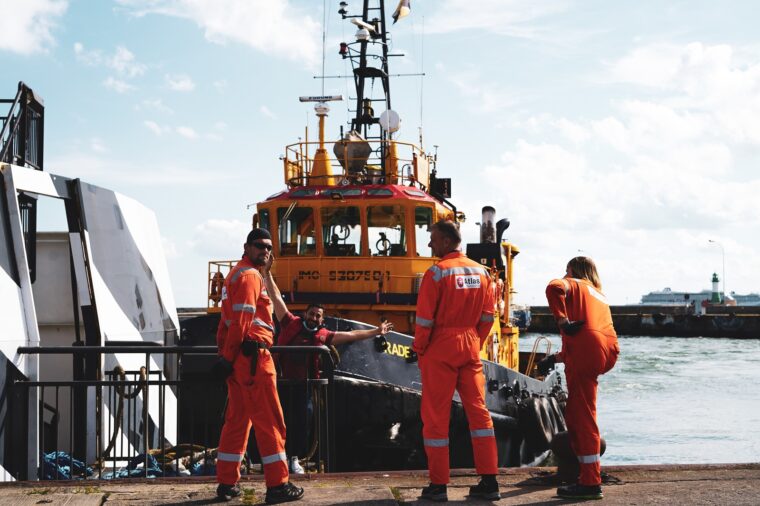
Malaysian employees at the center of the dispute
What is happening to over 40 Malaysians transported here to work on the ship? For a few weeks now, they have been waiting at a nearby hotel and playing pool. Some of them are worried about their families waiting at home for their suddenly unsure pay. If the project had started on schedule, they would be on the ship by now, they would receive full board and lodging, laundry services, etc. The majority of them don’t even have credit cards and they cannot afford a couple of weeks worth of living in Germany. The German company that is responsible for employing them sends them cash every few days, so that they can stay there until the political rows are over.
Talking to me is definitely an escape for them. They don’t really understand who I am or why I am interested in this project, but they are happy about the interest they are finally experiencing. They do not know why so many complications are surrounding this project, or what is the future of their jobs. One of them admits to me he is a Donald Trump fan. He does not know that it is the U.S. President who is blocking his job. The people who work closest to the project seem to be completely uninterested in the high-level political conflict. Not only that, they do not believe that it will impact the future of the project in the end. There is job to be done and politics is only complicating it.
Who is worried about the environment
The Nord Stream 2 issue has been dominated in the media by big politics, but not much is being said about its environmental impact. Is there a reason to be concerned about nature in the final, unfinished section of the pipe? Since even the Danish Energy Agency agreed for the Akademik Cherskiy to use anchors when pipe laying, it seems the process should not have a big impact on the environment. And yet. I ask Jochen Lamp, the leader of the local division of WWF what his organization is doing about the project. „We were very active back in 2018 when the environmental permits for the project were issued. We undermined the whole endeavour in court,” Lamp replies. „It took us a lot of time. Now it seems that there is nothing that could be done to stop the project, so we not engaging as much. Once the gas pipeline is completed, we will fight for environmental compensation for the region,” he adds. Even Jochen Lamp, who has been working for 30 years to protect the local nature, seems to be certain the project will be completed.
A different German environmental protection agency, DUH (Deutsche Umwelthilfe), announced it would file a lawsuit against the environmental permits issued in 2018. In their opinion, the latest methane leaks in the North Sea show that the climate has drastically changed in the last two years, which is why the impact of Nord Stream 2 on climate change should be reconsidered. However, according to unofficial information I obtained during informal talks with people engaged in the project, DUH’s reputation is not strong enough to convince the court to stop the construction on the basis of their suit.
The majority of people involved with Nord Stream 2 seems not to care about the ongoing political dispute. Probably this is not the first time they are witnessing such issues, and they know that business and money dictate the game rules in the end. Many of my interlocutors haven’t even heard about Navalny, the Russian opposition leader, who has been embroiled in the issue of the Russian-German cooperation. The political turmoil only complicates the project’s logistics, because some companies have already withdrawn from it. However, it is certain that those vacancies will be filled in by other companies ready to cooperate.
Whereas, nobody knows when the Akademik Cherskiy will actually set out to the Baltic Sea. The German company that manages the staff extends the validity of hotel cards almost every day, not knowing when the workers will be transferred onto the ship. Every day, someone from the agency drives by the hotel, hands over the cash for food, which is then evenly split between the Malaysians. The company does not want to reveal itself, fearing the U.S. sanctions. Despite the fact that everything is legal, the dispute between the U.S., Germany and Russia and its consequences bring to mind the times of cold war and spying operations.
